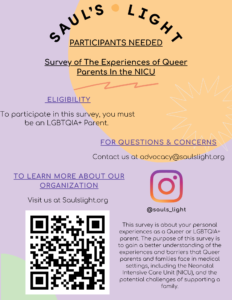
Making the Experiences of Queer Families More Equitable
By Treasure Joiner
This summer, I made progress in the project I am leading with Saul’s Light to make the experiences of Queer Families more equitable in the NICU. This first started as an idea and has now progressed into an initiative that is very much needed for the Queer community of New Orleans. This topic, as well as the use of inclusive language, will also be discussed at Saul’s Light’s annual NICU Health & Equity Summit this September.
During this term, I conducted interviews with NICU parents and local organizations that have supported Queer families and individuals in New Orleans. I wanted to gain a better understanding of the barriers, needs, and experiences of these families, whether they were internal, interpersonal, or socio-cultural. Through these interviews, I came to realize that it was difficult to come across a specific organization that supports Queer families and parents, besides a few Facebook communities, in New Orleans. I did not come across an organization or support group specifically for Queer families that had experienced infant loss or admitting their baby into the NICU. During interviews with local organizations such as Labor & Love and PFLAG New Orleans and my research on the birthing experiences of Queer parents, I learned that family building can look a variety of different ways, including surrogacy, preconception care, and lactation. I also learned that the barriers and discrimination care in obstetric settings impact birth outcomes of Queer families. These barriers include feeling discomfort, anger, anxiety, or unseen when interacting with their medical providers and navigating heteronormative spaces. Other barriers included financial barriers involving fertility clinics and struggles with non-gestational parent participation. Some positive feedback that I received from Queer families included the desire for Queer representation in the NICU and other hospital settings. There was also a desire for relationship-building opportunities between providers and patients, as well as signage that made Queer parents and families feel welcomed to create a space of trust and safety. Queer parents also wished for medical providers to be intentional about making space for Queer non-gestational parent(s) feel included in the birthing experience and practicing inclusive language. Hearing this feedback from families was helpful in envisioning solutions to make the experiences of Queer Families more equitable in the NICU.
The autonomy I have received in this initiative has taught me many lessons. It has taught me to be patient, creative, and flexible. The obstacles I encountered included finding solutions to increase the number of interviews and data I was collecting about what can be accomplished to better support Queer families in the NICU. I learned that such projects do not happen overnight and that this work requires me to be strategic about the ways I can work toward reaching my goals.
